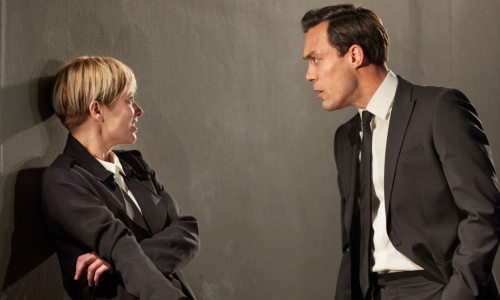Review: I’m Not Running

With 17 original plays debuting at the National Theatre, screenwriting credits that include The Hours and The Reader, a steady stream of writer/director gigs for the BBC, and a knighthood, we may have to start referring to David Hare by that most patronising of titles: the national treasure.
His latest play, I’m Not Running, centres around another national treasure: the NHS. It follows two bright young things, Pauline and Jack, on their journey from depressed students in a fraught relationship, to the pair most likely to battle it out for leadership of the Labour Party. All this despite Pauline’s protestations that she’s not, in fact, running.
It’s one of Hare’s more Alan Bennett-ish plays, its thorny issues wrapped in a deceptive layer of nostalgia, a tea cosy perched upon a landmine. And yet it never quite detonates, fizzling out in a largely unsatisfying final act.
We’re introduced to Pauline, a tough-but-brittle medical student with a ginormous chip on her shoulder, as she’s breaking up with her puppy-ish boyfriend. This boyfriend turns out to be Jack, the son of a beloved Labour Party grandee, who bears an equally large chip on his shoulder.
Pauline goes on to become a doctor in a soon-to-be-closed Corby hospital; after winning hearts and minds in her bid to save the old place, she enters politics as an independent. Jack takes the more traditional route, becoming a lawyer and carefully planning his roadmap to power, carrying with him an air of the heir to Blair.
It’s a tale of the opposing ideologies that have dogged the Labour party since before I was old enough to vote: old vs New, pragmatism vs idealism, populism vs the establishment. It also explores how the personal impacts on the political, how Pauline and Jack’s relationship – with suggestions of abuse on both sides – spurs them to make decisions that could affect a nation. It’s hard not to think back to Tony lounging in the bath while Gordon briefed him on the latest economic figures.
Hare is, of course, a pro, and there are moments to savour. An opening scene, in which a press officer fields questions about why he’s not taking any questions would work as a stand-alone sketch, and there are some hilariously biting observations about the current political climate, such as “Why is the Labour Party on the wrong side of every argument?”, and “The Labour Party is not interested in votes – it’s interested in process.”
But these are the high-points in a play that feels hollow at its core. Its characters remain inscrutable and unlikable to the end, and the staging, which takes place in a single rotating cube, becomes oppressive after a while.
It’s not a bad play, but neither is it one for the ages; not to worry, there’ll be another one along soon.

